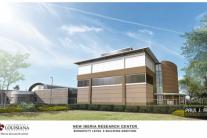Richard "Dan" Hereford (ME '69) and his wife, Larry Ann, have made a transformative $500,000 gift to the University
State funds enable creation of Iberia Parish biopharmaceutical corridor
Tue, 08/30/2022 - 3:44pmTwo new projects in Iberia Parish will create a biopharmaceutical corridor with research and drug manufacturing that will impact lives across the globe.
The University of Louisiana at Lafayette and Iberia Parish officials announced the expansion of the University’s New Iberia Research Center and the construction of the Iberia BioInnovation Accelerator in the Progress Point Business Park on Tuesday, Aug. 30.
Both projects are the result of a nearly $50 million investment of state capital outlay funds brought to Acadiana by its legislative leaders.
Nearly $25 million will lead to the creation of a Level 3 biosafety lab at NIRC – the nation’s largest non-human primate center – that will enable advanced on-site research with infectious diseases. More than $22 million will go toward the development of a BioInnovation Accelerator drug manufacturing facility at Progress Point.
A Level 3 biosafety lab at NIRC will have global implications on infectious diseases. During the COVID-19 pandemic, NIRC played a critical role in the development of the Pfizer vaccine, the world’s first widely available coronavirus vaccine and the first to win FDA approval.
This life-saving measure, however, was delayed three months because final testing could not occur at NIRC’s Level 2 facility. “A Level 3 facility at NIRC will eliminate such delays,” said Dr. Joseph Savoie, UL Lafayette president.
The BioInnovation Accelerator would transform the research and clinical trial data into real-world pharmaceuticals through manufacturing. The pharmaceuticals would then be brought to market and to households, Savoie said.
“In a biopharmaceutical corridor such as the one that will be created here in Iberia Parish – with the combined power of NIRC and the BioInnovation Accelerator – you can envision a future in which a drug is taken from research to testing to manufacturing to the marketplace – with each step taking place within about 5 miles of each other.
Savoie added: “A new biopharmaceutical sector in south Louisiana is not just good for the local economy. It’s good for humanity in every corner of the world.”
Preliminary economic impacts include the creation of nearly 550 new jobs with $10.6 million in annual tax revenues for Iberia Parish. The total economic output is estimated to be $144.3 million.
“The promise of what these projects can bring to our parish is something we’ve never seen,” said M. Larry Richard, Iberia Parish president. “The expansion of NIRC and the BioInnovation Accelerator are game-changers for our economy and for our people. I’m thrilled these projects will be in our parish and form the state’s biopharmaceutical corridor.”
Dr. Ramesh Kolluru, vice president for Research, Innovation, and Economic Development at UL Lafayette, called the two projects “transformational for the University, Iberia Parish, the region, and the state of Louisiana” that “couldn’t have happened without people coming together for the greater good of where we live and also for the greater good of the lives that will be impacted.”
Kolluru said the University and Iberia Parish leaders first introduced the idea for the biopharmaceutical corridor – with the NIRC expansion and the construction of the BioInnovation Accelerator as its nucleus – about a year ago to the Acadiana Legislative Delegation and area economic development agencies.
“Members of the Acadiana Delegation recognized the significance of these projects on Iberia Parish and beyond when it was introduced,” said Page Cortez, State Senate president. “This new biopharmaceutical sector will bring economic development to the region but it will do so much more than that. The research that will be conducted here will result in life-saving pharmaceuticals.”
Louisiana Economic Development Undersecretary Anne Villa said the projects "add to the state’s extraordinary momentum in enhancing life sciences business investment and diversifying the sectors creating new jobs and economic activity in the Acadiana region."
“Diversification is the key to economic competitiveness in the future economy. The Acadiana region has positioned itself for success by continuing to support traditional energy and aviation businesses while targeting growth opportunities in the bioscience and tech sectors. Tonight’s announcements add to that trend of innovation and diversification. We look forward to continuing to work with higher education partners, our local and regional economic development partners and stakeholders to support and accelerate those efforts,” Villa said.
Both projects are expected to be completed in the next two years.

